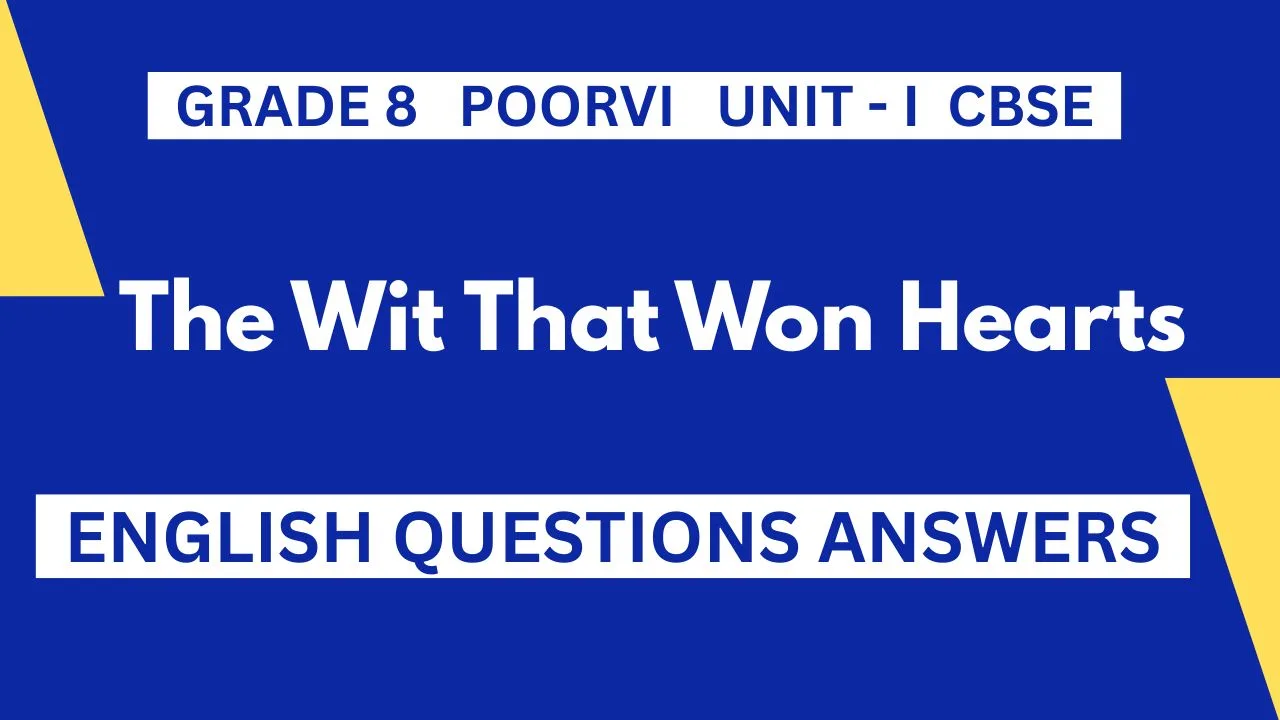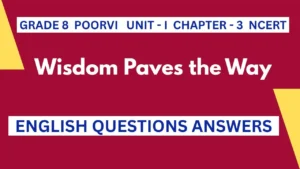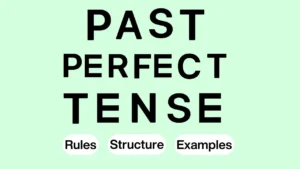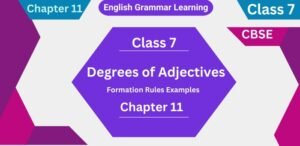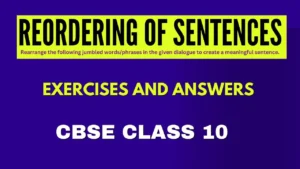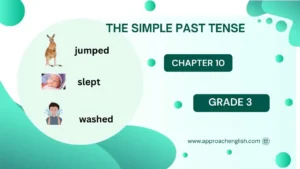The Wit That Won Hearts Answers English Class 8 CBSE – This guide offers NCERT-based textual solutions from Unit 1: Wit and Wisdom of the POORVI English textbook (2025–2026 new syllabus). It includes detailed question-answers, a summary, word meanings, and extra questions for thorough understanding. Prepared specially for Class 8 CBSE students, this resource follows the new curriculum and exam pattern.
Let us do these activities before we read. (Page 1)
I. Select the qualities of a person who uses wit from the box given below.
| wise, serious, clever, powerful, stubborn, courageous, observant, charming, humorous, creative, punctual, confident, energetic |
Now, discuss reasons for your choice of qualities.
Ans: Reasons for the choices:
- Wise – A witty person knows the right thing to say at the right time.
- Clever – Wit often involves quick and smart thinking.
- Observant – They notice small things and turn them into funny or smart remarks.
- Charming – Their words and humour make others like them.
- Humorous – Wit often includes fun and laughter.
- Creative – They can think of unique ways to solve problems or make others laugh.
- Confident – A witty person is bold enough to speak cleverly in front of others.
II Work in pairs and answer the riddles that are given below. Share the answers with your classmates and teacher.
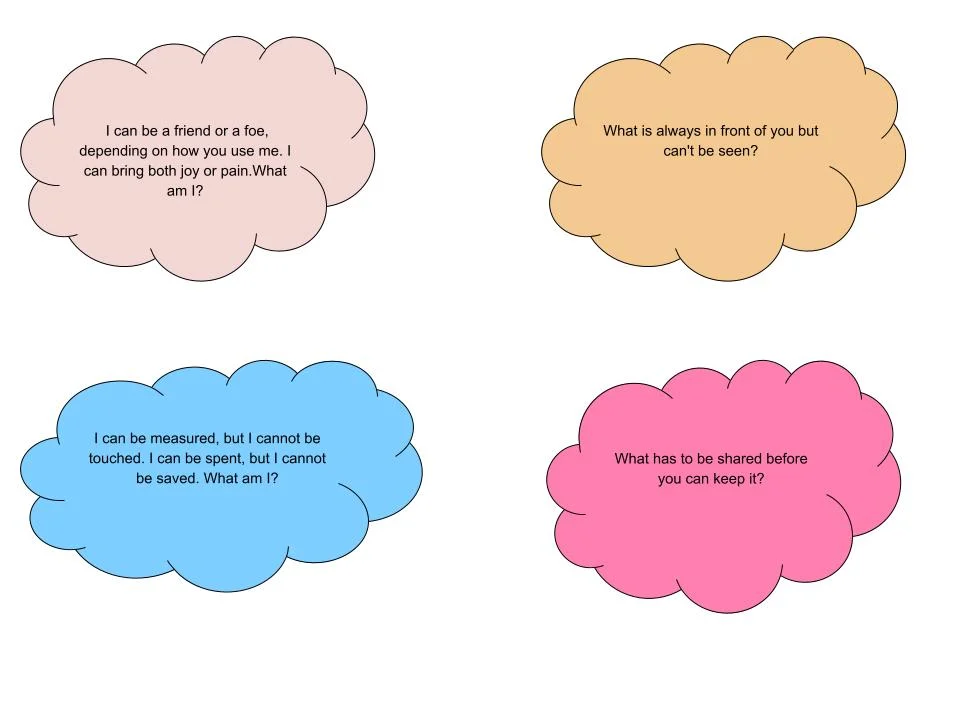
Discuss in pairs. (Page 2)
1. Why are qualities like humour and wit important in a person?
Ans: Humour and wit make people fun to be around. They help reduce stress and bring smiles during tough times. Witty people can solve problems smartly with calm words. These qualities also help in making good friends and staying happy.
POORVI: Textbook of English for Grade 8 NCERT Solution 2025-2026:
2. Why do you think kings and queens preferred to have witty people among their courtiers?
Ans: Witty courtiers could make the king and queen laugh and feel relaxed. They gave clever advice and helped solve tricky matters. Their smart words entertained guests and made the court lively. They were often trusted during tough decisions or conflicts.
3. If you were asked to solve a disagreement between two people, which approach would you take?
Ans: First, I would listen to both sides calmly and carefully. Then, I’d ask them to understand each other’s feelings. I’d try to find a middle way that suits both. Finally, I’d make sure they agree and feel peaceful again.
4. Have you ever been in a situation where a small misunderstanding led to a big problem? How was it resolved?
Ans: Yes, once I thought my friend was angry with me. Later, I found out it was just a joke I misunderstood. We talked honestly and cleared everything up. Now, we laugh about it and try to speak clearly.
Summary of the Story:
The story is set during the rule of King Krishnadeva Raya of the Vijayanagara Empire, known for his wisdom, wealth, and patronage of art and literature. Among the eight great poets in his court, Tenali Ramakrishna stood out for his wit and intelligence. One day, the king had a quarrel with his queen, Thirumalambal, because she yawned while he was reading a poem. Feeling insulted, he stopped speaking to her. The queen, upset and helpless, asked Tenali Rama to help resolve the issue.
Rama, known for his cleverness, used a smart trick during a court discussion on farming. He introduced magical paddy seeds and cleverly hinted that yawning while sowing seeds could spoil the harvest. This made the king laugh and recall the queen’s yawning. He realized his mistake and felt guilty for overreacting.
Later that evening, the king apologized to the queen, admitting his pride had blinded him. The queen forgave him, and they made peace. Rama’s wisdom and humour brought back joy to the palace. This story teaches us the value of understanding, forgiveness, and how wit can solve serious problems without conflict.
Word Notes from the Text:
1. Renowned – Famous; widely known and respected
2. Glory – Great fame or honour
3. Illustrious – Highly respected and admired
4. Monarch – King or queen
5. Flourished – Grew or developed well; thrived
6. Patron – Supporter, especially of the arts or education
7. Eminent – Distinguished; well-known and respected
8. Acclaimed – Praised highly in public
9. Celebrated – Famous for a special skill or quality
10. Enriched – Improved in quality or value
11. Masterpieces – Great works of art or literature
12. Quick wit – Sharp intelligence or smart thinking
13. Insurmountable – Impossible to overcome
14. Beloved – Deeply loved and admired
15. Disharmony – Lack of agreement or peace
16. Quarrel – Argument or fight
17. Trivial – Unimportant; minor
18. Utter – Say or speak
19. Forlorn – Sad, abandoned, or lonely
20. Distraught – Extremely worried or upset
21. Vague – Not clear or specific
22. Reciting – Reading aloud from memory or text
23. Disrespected – Treated without respect
24. Stormed off – Walked away angrily
25. Profusely – A lot; in large amounts
26. Bustling – Full of activity; lively
27. Intricately – With many small and detailed parts
28. Ornate – Highly decorated
29. Stern – Serious and strict
30. Gnawed at – Troubled or worried deeply
31. Advocated – Supported or recommended
32. Amused – Entertained; finding something funny
33. Unfazed – Not disturbed or bothered
34. Hush – Silence
35. Furrowed (eyebrows) – Wrinkled in worry or thought
36. Sceptical – Doubting; not easily convinced
37. Reap – To gain or receive (especially as a result of effort)
38. Scatter – Spread around in different directions
39. Erupted (into laughter) – Suddenly burst out laughing
40. Off guard – Unexpectedly surprised
41. Realisation dawned – Suddenly understood
42. Regret – Feel sorry for a past action
43. Overreacted – Responded too strongly
44. Orchestrated – Carefully planned or arranged
45. Settlement – Resolution of a problem
46. Brimmed – Filled to the top
Let us discuss (Page 7)
I Rectify the following false statements from the text.
1. The queen insulted the king by speaking against the quality of his poem.
Correct: The queen did not insult the poem. She was tired and yawned, which the king misunderstood as disrespect.
2. Tenali Rama immediately went to the king and convinced him to talk to the queen.
Correct: Tenali Rama took time and planned a smart way to make the king realise his mistake.
3. The courtiers admired the king’s poem and praised his literary talent.
Correct: The courtiers avoided commenting on the poem and even made excuses to escape.
4. The ministers in the court were eager to hear Tenali Rama’s idea about paddy cultivation.
Correct: The ministers were doubtful and even made fun of Rama’s seed idea.
5. The king never realized his mistake and continued to stay angry with the queen.
Correct: The king realised his mistake after Rama’s clever plan and apologised to the queen.
Let us think and reflect (Page 7)
I Read the extracts and answer the questions that follow.
1. “……The king thought I was disrespecting his poem and stormed off. Since then, he has not spoken to me. If I had known this
would happen. I would have chosen another day. Help me, please, Rama. Only you can help the king understand.”
Rama nodded thoughtfully “If you like, I will try my best to resolve this matter, Your Highness. But this needs a well-planned approach and I may need time to find the right strategy.”
(i) Why does the queen believe that only Tenali Rama can help the king understand?
Answer: The queen believed only Tenali Rama could help because he was wise, witty, and had the king’s trust. He had solved many difficult problems before with his intelligence and humour. She trusted his skills to make the king realise the truth without hurting his pride.
(ii) What does the queen’s statement, “If I had known this would happen, I would have chosen another day”, suggest about her feelings?
A. She is angry at the king for overreacting.
B. She regrets the untended misunderstanding.
C. She believes the poem was not worth listening to.
D. She is worried that the king might punish her.
Answer: B. She regrets the unintended misunderstanding.
(iii) How does Tenali Rama’s response reflect his wisdom and problem-solving skills?
Answer: Tenali Rama’s response shows he thinks deeply before acting. He did not rush to solve the problem. Instead, he planned carefully. His wise reply shows he understands people’s emotions and always looks for a clever, kind way to solve serious matters.
(iv) Fill in the blank by choosing the correct option from those given in the brackets.
The king’s reaction shows that he is sensitive and _________________ (has a lot of faith/takes great pride) in his poetry.
Answer: The king’s reaction shows that he is sensitive and takes great pride in his poetry.
2. That evening, the king approached the queen with a softened expression. “Thirumalambal”, he began, his voice gentle, “I have been foolish. I see now that I overreacted. I let my pride blind me. I’m so sorry”
The queen, who had longed for this moment, smiled and replied, “If you like, we can leave this quarrel behind us. I would very much like to listen to your poem.”
(i) Complete the following with a suitable explanation.
When the king said, “I let my pride blind me”, he means that _____________
Answer: ____ he was too proud to see the real reason behind the queen’s yawning and misunderstood her actions.
(ii) Why does the queen say, “If you like, we can leave this quarrel behind us”?
Answer:The queen says this because she wants peace and forgiveness. She does not want to stay angry. She loves the king and wants to make things right again. Her words show she is kind and ready to forget the past.
(iii) Fill in the blank by choosing the correct option from those given in the brackets.
The king acknowledges that his pride clouded his judgement which shows ____________ (intelligence and courage/maturity and self-awareness)
Answer: The king acknowledges that his pride clouded his judgement which shows maturity and self-awareness.
(iv) State any one characteristic that the queen’s response to the king’s apology shows about her.
Answer: The queen’s response shows that she is forgiving and understanding. She values love and peace more than ego.
II Answer the following questions. (Page 8)
1. Why was the Vijayanagara Empire considered to be in its ‘Golden Era’ during Krishnadeva Raya’s reign?
Ans: Krishnadeva Raya was a wise and powerful king. During his rule, art, literature, and buildings developed greatly. He supported poets and wrote famous works himself. This time was rich in culture and learning, so it is called the Golden Era of the Vijayanagara Empire.
2. How did Tenali Ramakrishna gain a special place in the king’s court?
Ans: Tenali Rama was known for his clever mind and great sense of humour. He solved problems in a smart and funny way. He was also a talented poet. His sharp wit and loyalty made him a trusted and loved member of King Krishnadeva Raya’s court.
3. How did the quarrel between the king and the queen affect the palace?
Ans: The king stopped talking to the queen and avoided her completely. The cheerful atmosphere in the palace became quiet and dull. The happy life in the palace was disturbed. Everyone felt sad because the royal couple were not talking to each other.
4. What strategy did Tenali Rama use to make the king realise his mistake?
Ans: Tenali Rama brought paddy seeds and said they would give great results. When courtiers laughed and the king doubted him, Rama joked about yawning while sowing seeds. This made the king realise yawning is natural, and helped him understand he misunderstood the queen.
5. What was the reaction of the courtiers when Tenali Rama introduced his ‘special’ paddy seeds?
Ans: The courtiers laughed and made sarcastic remarks about the seeds. Some joked they came from the moon. They did not believe Rama and found his idea funny. But later, his real message became clear, and they respected his smart way of handling the issue.
6. How does the story conclude, and what lesson can be learnt from it?
Ans: The king understood his mistake and apologised to the queen. The queen forgave him, and happiness returned to the palace. The story teaches us to not jump to conclusions, to forgive easily, and to understand that small actions should not hurt big relationships.
Let us learn (Page 9)
I. Fill in the blanks and complete the paragraph by choosing suitable expressions from the box given below.
[cast a shadow, mind raced back, murmur swept through the room, stormed off, hush fell over, rippled through]
My mother is quite witty, and her sense of humour always lightens stressful moments. Once, at a family dinner, an argument began over a minor issue, and 1. a hush fell over making everyone feel uncomfortable. Just as things were getting serious, she made a clever remark and laughter 2. rippled through the gathering, making everyone relaxed. The person who started the argument 3. stormed off. Everyone disapproved of the action and a 4. murmur swept through the room. My 5. mind raced back to how my mother had saved other situations like this. Without her, such moments would have 6. cast a shadow over the gatherings. I hope that I grow up to be as witty as my mother.
II The writer uses words like ‘roared’, ‘murmur’ in the text to indicate the sound produced. Fill in the blanks with suitable sound words from the box given below. You may refer to a dictionary.
[murmur, snickers, sighed, thud, mumble, groan, gasped, rattle, roared, whispered]
Answer:
1. As the teacher began the riddle challenge, a murmur of excitement spread through the classroom.
2. Anaya sighed in relief—she loved riddles more than solving Mathematics problems.
3. “Think carefully,” the teacher began to mumble, as she wrote a riddle on the board.
4. When the question was revealed, a few students groaned, realising it wasn’t as easy as they had expected.
5. Some exchanged snickers, wondering if anyone at all would be able to solve it.
6. Just then, Anaya tapped her book on the desk with a small thud, deep in thought.
7. “Ah, I see it now!” she said stretching with a gasp, as if it had taken her great effort.
8. A small breeze made the windows rattle, adding to the suspense of the moment.
9. “So, what’s the answer?” the students roared, their voices filled with playful enthusiasm.
10. Leaning forward with a smile, Anaya whispered, “Sometimes, the trickiest questions have the simplest answers.”
III As you have learnt, a compound word is formed when two or more words are combined to create a new word with a distinct meaning. These are of three types: closed compounds (sunlight, courtroom), hyphenated compounds (well-planned), and open compounds (paddy seeds).
1. Create new compound words by matching words in Column 1 with those in Column 2.
Answer:
| Column 1 | Column 2 | Compound Word |
| (i) quick | G. witted | quick-witted |
| (ii) soft | B. tempered | soft-tempered |
| (iii) common | F. sense | common-sense |
| (iv) house | E. store | house-store |
| (v) book | H. hold | book-hold |
| (vi) ill | C. spoken | ill-spoken |
| (vii) sky | D. blue | sky-blue |
| (viii) dance | A. hall | dance-hall |
2. Fill in the blanks with the words created in the previous question.
Ravi was (i) soft-tempered, always speaking calmly even in arguments. He grew up in a lively (ii) dance-hall, where he learned to handle different personalities. His friend Arun, however, was (iii) ill-spoken and often lost his patience. Despite this, Arun admired Ravi’s (iv) quick-witted thinking. One evening, as they passed a (v) house-store, they saw some performers rushing out. Ravi noticed that one of them dropped a (vi) book-hold book on the ground. “Is this yours?” he asked. “Oh thank you, young man!” the performer smiled. “It’s a recent purchase from the (vii) sky-blue round the corner.” True to his nature, Arun promptly said to Ravi, “It’s (viii) common-sense that it’s not from a bakery but bookshop!” Ravi smiled and they walked on.
IV Read the sentences from the text and their explanation given in the table below.
| Sentences from the Text | Tenses | Explanation |
| 1. If you like, I will try my best to resolve this matter. | Simple Present +Present Modal | The condition in the ‘ifclause may or may notbe fulfilled. The presenttense refers only to apossible future action |
| 2. If, by chancesomething were to gowrong, our farmerswould suffer. | Simple Past +PastModal | The condition in the’if clause expressesa hypothetical orimaginary situation. |
| 3. If I had knownthis would happen, Iwould have chosenanother day. | Past Perfect + would +have Past Participle | The condition in the ‘ifclause describes whatthe speaker would havedone (differently) ifthe past situation hadbeen different and it isimpossible to rectify itin the present. |
In sentence 1 ‘if you like’ is the subordinate clause (if clause) and ‘I will try my best to resolve this matter’ is the main clause. Identify the subordinate and main clauses in sentences 2 and 3.
Now, match the subordinate clauses (if clauses) in Column 1 with the appropriate main clauses in Column 2 to make complete sentences.
| Column 1 | Column 2 |
| (i) If I had a magic wand, | A. We will go to the theatre. |
| (ii) If it rains tomorrow, | B. I would sneak into the secret room. |
| (iii) If you had listened carefully, | C. I would give myself wings. |
| (iv) If you finish your homework, | D. The boys would have woken up on time. |
| (v) If I were invisible, | E. We will stay indoors and play board games. |
| (vi) If the alarm had rung, | F. You would have solved the puzzle. |
V Complete the following sentences appropriately with either the main clause or the subordinate clause (if clause).
Answer:
1. Your teacher will be unhappy if you do not complete your homework on time.
2. They would have caught the train if they had left the house a little earlier.
3. If you continue to stay up late every night, you will feel tired and sleepy in class.
4. If she knew the answer, she would raise her hand to respond.
5. If she had studied harder, she would have passed the exam easily.
6. If I had a million rupees, I would help the poor and build a library.
VI Complete the following sentences. One example has been done for you.
Answer:
1. If I were a tree, I would play with the wind and talk to the birds.
2. If I were the Head Teacher of my school, I would make learning more fun and interesting.
3. If I were a bird, I would fly freely across the sky and explore the world.
4. If I were a magician, I would make all sadness disappear with a magic wand.
5. If I had studied harder, I would have scored the highest marks in the test.
Let us listen (Page 12)
I You will listen to a woman narrating a story. As you listen, fill in the blanks in the following sentences by selecting the correct options. (Transcript for teacher on page 46)
1. The rope tying the bundle of sticks was
(i) loose
(ii) thick
(iii) short
Ans: (ii) thick
2. The scholar is finally referred to as
(i) irritable
(ii) mischievous
(iii) arrogant
Ans: (iii) arrogant
II You will once again listen to the story. As you listen, number the events of the story in the correct order of occurrence.
Answer:
Number the events of the story in the correct order of occurrence
Here is the correct sequence of the events:
- The visitor wanted to show his superiority over others in the palace. 5.
- The court scholars were afraid of the king’s anger. 8.
- Rama accepted the challenge thrown by the visitor. 2.
- Rama had a bundle tied in silk when he came to the palace. 3.
- The great scholar was ashamed because he did not know what to say. 1.
- The king wanted to know more about the work mentioned by Rama. 7.
- Rama showed the work to be a bundle of sticks tied together by a rope. 6.
- The king laughed at the explanation given by Rama. 4.
Let us speak (Page 13)
I While asking questions, it is important to use the appropriate tone to convey the correct meaning.
1. ‘Yes’ or ‘No’ questions have a rising tone at the end.
Are you coming home?
2. ‘-Wh’ questions have a falling tone at the end.
When will you come home?
This rise and fall in tone is called intonation.
Now, work in pairs and mark the intonation in the questions given below. Take turns to practise by saying them aloud with the correct intonation.
Answer:
🔼 = Rising tone (Yes/No questions)
🔽 = Falling tone (‘Wh’ questions)
- (i) Is this your cat? 🔼
- (ii) What is the name of your cat? 🔽
- (iii) Will you be going to your village? 🔼
- (iv) Why are you going to your village? 🔽
- (v) Is this where you live? 🔼
- (vi) Where do you live? 🔽
- (vii) Can I meet your parents? 🔼
- (viii) How are your parents? 🔽
- (ix) Do you have any plans for tomorrow? 🔼
- (x) What are you going to do tomorrow? 🔽
II “What’, ‘Why’, ‘When’, ‘How’, ‘Where’, and ‘Who’, are the words used ask questions. These words are called question words. Let us use these words and make some questions.
- While making questions, remember the correct word order.
- Who is the cleverest character in the story? (Correct)
- Who the cleverest character is in the story? (Incorrect)
Work in pairs and take turns to ask and answer questions about a trip that you are planning. Remember to use the correct intonation while
asking these questions.
Answer:
About a Trip You’re Planning
Here’s how to ask and answer using prompts:
- Where are you going? → I’m going to Darjeeling. 🔽
- Why are you going there? → I want to enjoy the mountains and cool weather. 🔽
- How will you travel? → We will go by train. 🔽
- When will you go? → We’ll leave next Saturday and stay for a week. 🔽
- Who is going with you? → My parents and my cousin are coming with me. 🔽
- What will you do there? → I will visit tea gardens and ride the toy train. 🔽
Now, work in pairs and take turns to ask and answer the questions about witty characters in folktales or stories you have read. Use the correct intonation while asking questions.
For example: Your favorite character in the folktale (Who…?)
Who is your favorite character in the folktale?
About Witty Characters in Folktales or Stories
- Who is your favourite character in the folktale? → Tenali Rama is my favourite. 🔽
- Why is his wit important in the story? → His cleverness helps solve difficult problems. 🔽
- What is the most famous trick he used? → He fooled a proud scholar with a made-up book name! 🔽
- When does the story take place? → During the time of King Krishnadeva Raya in ancient India. 🔽
- How did he use his intelligence to solve problems? → He used humour and logic instead of force. 🔽
- Where does the story take place? → In the kingdom of Vijayanagara. 🔽
Let us write (Page 15)
A narrative essay is written on a personal experience or an imagined experience.
Now, write a narrative essay based on any one of the situations given below:
- The Day I Learnt the Value of Teamwork
- A Small Act of Kindness that Made a Difference
Answer:
A Small Act of Kindness that Made a Difference
One rainy evening, I was walking home from my tuition class, holding my umbrella tightly against the wind. As I turned the corner near the market, I noticed an elderly man standing alone under a tree. His clothes were soaked, and he looked lost and worried. Something about him made me stop.
I hesitated for a moment, but then I went up to him and asked if he needed help. He told me that he had come to visit his daughter nearby but had forgotten her address. His phone battery had died, and he had no one to call. The rain was getting heavier, and he was shivering.
I quickly offered to share my umbrella and took him to the nearest shop where we could stay dry. I gave him my phone to call his daughter. After a few minutes, a young woman arrived, her eyes filled with worry and relief. She thanked me again and again for helping her father. The man smiled and said, “You are a kind soul. Thank you for stopping.”
That day, I realised that even a small act—like sharing an umbrella or letting someone use a phone—can bring comfort and hope to someone. Kindness doesn’t need to be big or planned; it just needs a caring heart.
The Day I Learnt the Value of Teamwork
It was our school’s annual Sports Day, and I had signed up for the relay race. I had never been part of a team event before and mostly preferred doing things on my own. But that day changed my view completely.
Our relay team had four members, and I was the third runner. We practised for weeks, and though we weren’t the fastest individually, we worked hard to improve our coordination. On the final day, the sun was bright, and the field was full of cheers. The race began, and our first runner gave us a good start. The second runner maintained the pace and passed the baton smoothly to me.
As I ran, I could hear my teammates shouting my name. That gave me strength. I handed the baton to our last runner, and he dashed forward. We didn’t come first, but we came second—and we were proud. We had given our best, together.
That day, I learnt that teamwork is not just about winning. It’s about trust, support, and working as one. Alone I could run fast, but with a team, I learnt how far we could go together.
Let us explore (Page 16)
I Limericks are poems in five lines that have a twist in the last line. Read and enjoy the following limericks and create one on your own.
- Raju flew his kite in the sky so wide.
- It soared with grace, full of pride.
- But a crow came along.
- Singing its song.
- And now it’s the crow on a joyride!
Answer:
- A monkey once sat on a tree,
- Munching bananas with glee.
- He slipped on the peel,
- Did a cartwheel,
- And landed right next to a bee!
Il Go to the library and read a story of your choice. Share its theme and the interesting parts of the story with your classmates and teacher.
Answer:
Title of the Story: The Clever Rabbit (a Panchatantra tale)
Theme:
The theme of the story is intelligence over strength. It teaches us that clever thinking and wit can solve even the most difficult problems.
Interesting Part:
When the rabbit tricks the fierce lion by pretending there is another stronger lion in the well. The lion jumps into the well to fight his reflection and drowns. The forest is safe again!
III You must have read stories of wit, humour, and wisdom in your own language or English. Make a list of these stories that you have read on a chart paper. Each student should read at least one new story from the list.
Answer:
| Story Title | Language | Main Character | Key Theme |
| Tenali Rama and the Greedy Brahmin | English | Tenali Rama | Wit and cleverness |
| Birbal’s Khichdi | English/Hindi | Birbal | Justice and quick thinking |
| The Clever Rabbit | English | Rabbit | Brains over brawn |
| Mullah Nasruddin’s Donkey | English | Mullah Nasruddin | Humour and simple wisdom |
| Gopal and the Hilsa Fish | English | Gopal (Courtier) | Smartness and humour |
| The Lion and the Mouse | English | Mouse | Helping others; kindness matters |

